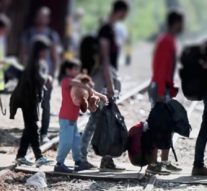
Is Europe ready to settle the migrants ahead of winter
Migration 1 November 2020The Covid19 pandemic strikes again. The disease is spreading all across the European continent leaving catastrophic consequences towards the national economies. Simultaneously, the migrant crisis is still ongoing, and thousands of migrants are arriving to the Western Europe countries through the Balkans’ route. This article presents the most pressuring issues related to migrant crisis in the coming winter season, through review of report issued by the Council of Europe in form of recommendation for specific principles for managing the migrant crisis.
The Coronavirus disease (COVID-19) pandemic has created extraordinary challenges for the authorities of all the countries of Europe. The Council of Europe’s report states that there are specific and intense challenges for staff working in various places of deprivation of liberty, including police detention facilities, penitentiary institutions, immigration detention centres, psychiatric hospitals and social care homes, as well as in various newly-established facilities/zones where persons are placed in quarantine.
Whilst acknowledging the clear imperative to take firm action to combat COVID-19, all actors of the absolute nature of the prohibition of torture and inhuman or degrading treatment. Protective measures must never result in inhuman or degrading treatment of persons deprived of their liberty. In the Council of Europe’s view, the following principles should be applied by all relevant authorities responsible for persons deprived of their liberty within the Council of Europe area.
The basic principle must be to take all possible action to protect the health and safety of all persons deprived of their liberty. Taking such action also contributes to preserving the health and safety of staff. WHO guidelines on fighting the pandemic as well as national health and clinical guidelines consistent with international standards must be respected and implemented fully in all places of deprivation of liberty. Staff availability should be reinforced, and staff should receive all professional support, health and safety protection as well as training necessary in order to be able to continue to fulfil their tasks in places of deprivation of liberty. Any restrictive measure taken vis-à-vis persons deprived of their liberty to prevent the spread of COVID-19 should have a legal basis and be necessary, proportionate, respectful of human dignity and restricted in time.
As close personal contact encourages the spread of the virus, concerted efforts should be made by all relevant authorities to resort to alternatives to deprivation of liberty. Such an approach is imperative, in particular, in situations of overcrowding. As regards the provision of health care, special attention will be required to the specific needs of detained persons with particular regard to vulnerable groups and/or at-risk groups, such as older persons and persons with pre-existing medical conditions. This includes, inter alia, screening for COVID-19 and pathways to intensive care as required. While it is legitimate and reasonable to suspend nonessential activities, the fundamental rights of detained persons during the pandemic must be fully respected. This includes in particular the right to maintain adequate personal hygiene (including access to hot water and soap) and the right of daily access to the open air (of at least one hour). Further, any restrictions on contact with the outside world, including visits, should be compensated for by increased access to alternative means of communication (such as telephone or Voice-overInternet-Protocol communication).
In cases of isolation or placement in quarantine of a detained person who is infected or is suspected of being infected by the SARS-CoV-2 virus, the person concerned should be provided with meaningful human contact every day. Fundamental safeguards against the ill-treatment of persons in the custody of law enforcement officials (access to a lawyer, access to a doctor, notification of custody) must be fully respected in all circumstances and at all times. Monitoring by independent bodies, including National Preventive Mechanisms (NPMs) remains an essential safeguard against ill-treatment. States should continue to guarantee access for monitoring bodies to all places of detention, including places where persons are kept in quarantine. All monitoring bodies should however take every precaution to observe the ‘do no harm’ principle, in particular when dealing with older persons and persons with pre-existing medical conditions.
In July, the European Center for Disease prevention and control has issued a Guidance on infection prevention and control of coronavirus in migrant and refugee reception and detention centres in the EU/EEA. The report indicates that migrant and refugee reception and detention centres should be given priority for testing, due to the risk of rapid spread of SARS-CoV-2 in these settings. All individuals with COVID-19 compatible symptoms should be tested on arrival, and possible, probable or confirmed COVID-19 cases not needing hospitalisation should be isolated or separated from others in the premises. Contact tracing should occur for all cases identified as positive. Asymptomatic new arrivals can also be considered for testing to reduce the risk of introduction of cases in reception and detention centres.
It seems that the EU will be overloaded with the immigrants in the coming months. The winter is making the situation even harder, as it is not clear what will be the capacities of health and social centres across the EU.


